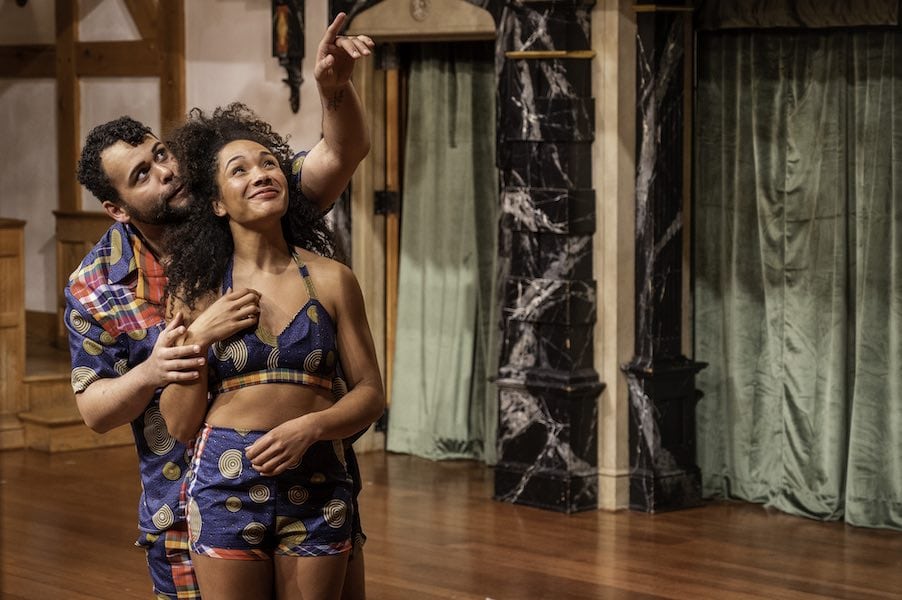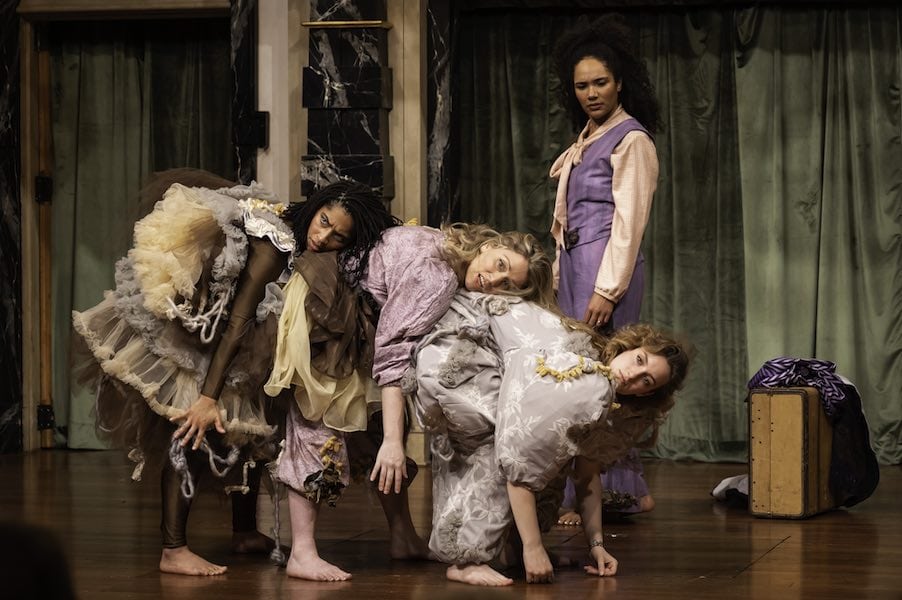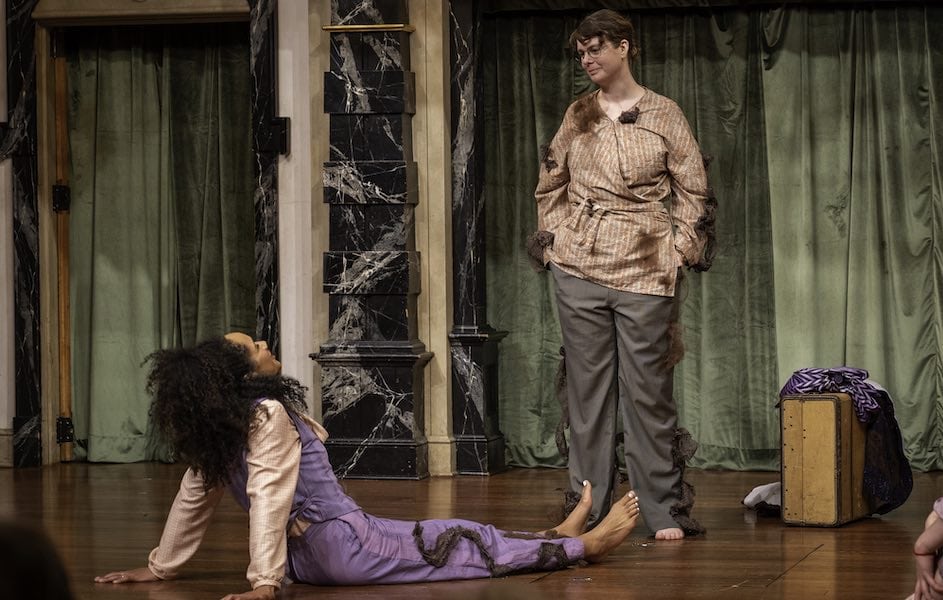It’s no secret how the tragedy Eurydice ends. There should be no surprises after two thousand years. And yet, American Shakespeare Center’s production made me forget. I was transported, watching Orpheus and Eurydice climb out of the underworld just as the first audiences must have done millennia ago. Across centuries, my breath synced in anticipation with theatergoers long dead, and for a moment, none of us knew how this would end.
Such is the time-traveling magic of Sarah Ruhl’s Eurydice, which reimagines the myth of Orpheus and Eurydice through the eyes of its heroine. In Ruhl’s adaptation, Eurydice (Kayla Carter) is tricked into dying by a Nasty, Interesting Man (Michael Manocchio) on the night of her wedding to musical Orpheus (Topher Embrey).

In the underworld, her already dead Father (Annabelle Rollison) awaits her. Father — a character inspired by Ruhl’s own dad, who passed away during her college years — eagerly welcomes his daughter to the underworld. He still remembers life on Earth despite being dipped into the River Lethe, the river of forgetfulness in which all dead souls are submerged. A mischievous chorus of Stones (Summer England, Kenzie Ross, and Constance Swain) rises from the river to narrate this reunion as well as the ever-growing grief of Orpheus. It is a tale of love, grief, memory, and choice that imagines Eurydice maybe had more reason to stay in the underworld than return to life with Orpheus.

Dripping with fantasy and whimsy, Ruhl’s adaptation is uniquely suited to the American Shakespeare Center ethos. Known for “doing it with the lights on,” ASC presents all of its productions in the same staging conditions as theatermakers would have used during the Renaissance. This includes use of universal lighting (where the lights stay on so audience and actors can see one another), doubling (one actor playing multiple roles in a show), cross-gender casting, and minimal sets.
This approach allows the actors and audience alike to focus on the language, letting it wash over us without the distractions of design. The story, if it’s strong enough, can stand alone. No need for projections, or elaborate lights, or million-dollar sets, or all the bells and whistles one can find at many Shakespeare-focused companies. The language is enough in the hands of a skilled cast and creative team.
It was more than enough for this team led by Director Nana Dakin, whose subtle direction is a masterclass in the simplicity of storytelling. Ruhl’s script is rife with stage directions, yet Dakin’s blocking appears naturally motivated. Her use of ground and balcony seats as playgrounds for the actors added to the sense of connection between actor and audience already established in the pre-show, which included a set of four songs by the company on piano, drums, bass, and melodica. Rather than dressing and performing as their characters, the actors introduced the music as themselves in their own clothes, evoking the traveling players of yore who would come to town with a tale to tell.
The musical direction by Tevin Davis enhanced the already inherent sense of community in the iconic Blackfriars Playhouse, gently warming up the audience for the company’s transformation into vibrant characters. The last pre-show song, shared by Embrey and Carter before becoming Orpheus and Eurydice, was a delicate dance that began with them back to back and underscored the electric chemistry their characters would embody.
Dakin’s tender staging was further strengthened by Ashleigh Poteat’s spirited, kaleidoscopic costume design, the effective intimacy choreography by Natasia Reinhardt, and the uncomplicated prop mastery by Alaina Smith. Poteat’s designs in particular bring such detail to each character, vividly elevating the characterization of each role. All design elements added to the production without distracting from the performances, which were overwhelmingly exquisite.
If there were no design at all, this band of actors would have been able to achieve the same impact — their connection and interpretation of Ruhl’s poetry was that mesmerizing. Carter’s naive Eurydice carried with her the weight of grief for missing the living, missing the dead, and the uncertainty that sort of conflict contains. Her character lives between the underworld and the one above, and Carter’s interpretation held this ambiguity deftly. Orpheus, played handsomely by Embrey, offers a rich, passionate agony that could move a stone to cry. Indeed, the chorus of stones — embodied intense and comedic physicality — brought comedic relief to the despair of living in the underworld for 90 minutes.
As the audience sat with this grief onstage, and perhaps in their own lives, there was no better embodiment of such grief than Rollison’s Father. She brought a Midwestern folksiness to the role that felt true to the text and underscored her deep understanding of it. She was realer as a father than many interpretations by male actors, and her performance makes a strong case for more cross-gender casting.

Above all else, this production is a testament to the mission of American Shakespeare Center — with Shakespeare’s staging conditions, we can forget the elaborate sets and design that can bog down modern theater. Classics can be made new again if only we look at them as our forebearers once did — with the lights on, as if it’s the first time.
Running Time: 90 minutes, with no intermission. Pre-show begins 15 minutes before curtain.
Eurydice plays through May 13, 2023, presented by American Shakespeare Center in repertory with As You Like It at the Blackfriars Playhouse, 10 South Market Street, Staunton, VA. For tickets, call the box office at (540) 851-3400, or purchase them online. https://americanshakespearecenter.com/events/eurydice/.
Credits for Euridice are online here (click on “cast” and on “artistic team”).
COVID Safety: American Shakespeare Center strongly encourages patrons to mask when possible. ASC’s complete COVID-19 Safety Visitor’s Guide is here.
SEE ALSO: A thrilling and stellar ‘As You Like It’ in rep at American Shakespeare Center (review by Andrew Walker White, March 19, 2023)




